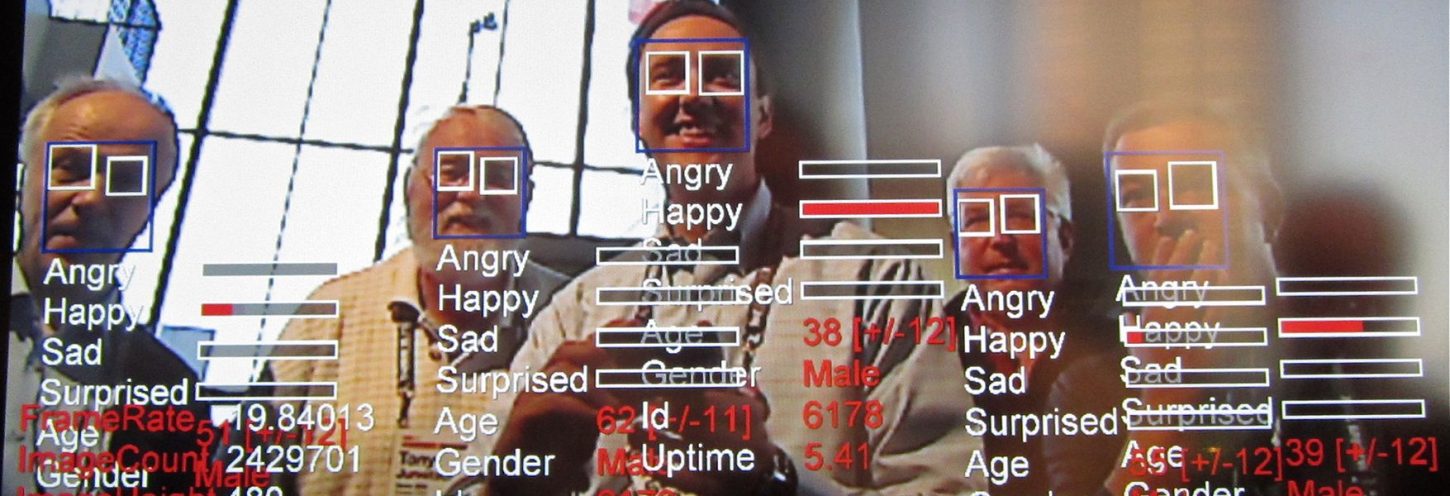Revealing Your Inner Self Outwardly
"That big guy in a rowdy bar may use new tech to see that you despise him and take offence. Your bosses might see your skepticism regarding their new initiatives. Your church could see that you aren't feeling very religious."
"Your school and nation might see that your pledge of allegiance was not heartfelt. And so on."
Robin D. Hanson, economist, futurist
"Properly socialized grown-ups [have an understanding amongst themselves that the meaning of] Have a nice day, Glad to see you! [and] We should have lunch sometime, only occasionally intersects with what those words actually mean."
"If I was the Chinese state, the first data I want is things like associates and movements -- ordinary factual information."
"Affective computing adds a massively deeper layer. Not only is your identity subject to surveillance, your movements subject to surveillance ... what's going on in your own head is potentially subject to surveillance, too."
William Buschert, philosophy lecturer, coordinator for applied ethics programming, University of Saskatchewan
 |
| MIT Media Lab: Affective Computing Group |
Who wouldn't actually cringe at the very thought that a machine trained in human expressions through artificial intelligence could accurately see what is behind that insincere smile or expression to more or less read your mind? The way we interact socially with others, whether they are casual acquaintances, strangers, close friends, even family members follows a cultural, social script of non-offence. We automatically react to others in a manner that smooths the way to good relations.
What we really think is remote from what we say for fear of offending. We keep our counsel to ourselves, while presenting a friendly face to the world. It's considered to be good manners to interact in such a way with others, avoiding confrontation at any level. It's when we are pushed to the wall, or become angry then we fail the discipline of discretion. So, then, if computers are trained to interpret what or how we really feel, what happens to the social contract?
Do we really want technology through the rise of affective computing -- the study and development of technology enabled to recognize and interpret human emotions -- to become reality? More, that is, than has already been accomplished. If we are hypocrites in our interaction with others it is for a good cause; the well-being of relationships, large and small, and a nicely functioning public arena. Systems of artificial intelligence drawing on massive databases of subtle factial expressions (micro-expressions) already exist.
The outfit Affectiva, offshoot of MIT''s media lab, produces such a program -- that is its function after all -- affective computing. According to Affectiva, its program is able to identify human emotions from peoples' facial expressions from videos with 80 to 90 percent accuracy. Software that can distinguish between various kinds of smiles -- a joyful smile where the eyes crinkle; a polite but inauthentic smile, as opposed to a skeptical smirk.
Dr. Buschert imagines a scenario where affective computing becomes commonplace and emotional privacy comes under constant scrutiny. Amazon is planning to produce a wristband able to scan the wearer's mood and "offer suggestions on how to better interact with other people". Non-invasive technologies like Affectiva's require only a video to measure facial emotions or detect emotions from a voice. He imagines future user agreements for phone, camera, smart speaker, webcam or social-media sites.
Data privacy is related to keeping facts about individuals' privacy under your self control, including where you spend time, what your passwords are, the words you Google and who are your friends. Another separate but related privacy is that of emotions, allowing us to maintain thoughts and feelings to our own cognizance. We've always had the discretion to keep our inner thoughts to ourselves, revealing them only if and when we decide to.
"Having some emotional privacy is necessary to actually make up your own mind, to act autonomously", pointed out Dr. Buschart.
 |
| Artificial intelligence : Open Mind |
Labels: Affective Computing, Artificial Intelligence, Computers

0 Comments:
Post a Comment
<< Home